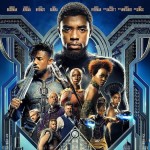 Every awards ceremony taking place this season and each trophy presented engenders a certain amount of pride, but pride was there in extra special doses at the 10th annual African American Film Critics Association Awards show held Wednesday night.
Every awards ceremony taking place this season and each trophy presented engenders a certain amount of pride, but pride was there in extra special doses at the 10th annual African American Film Critics Association Awards show held Wednesday night.
For starters, “Black Panther”– named best picture of the year and also one of the year’s biggest blockbusters–disproved once and for all that films starring and about black people don’t do well abroad. $1 billion in global box office would beg to differ, as would Ryan Coogler, who helmed the Disney/Marvel superhero picture and was awarded best director.
And then there was the presence of music legend Quincy Jones, the most Grammy-nominated artist in music history, honored with the Stanley Kramer Social Justice Award, presented by the late director’s widow, Karen Sharpe. Kramer directed groundbreaking films including “Guess Who’s Coming to Dinner,” ”Judgment at Nuremberg and “The Defiant Ones.”
“Stanley and Quincy have a lot in common. He was born in 1913 in Hell’s Kitchen and Quincy was born in 1939 in Chicago, neither of them in positions of privilege or wealth,” said Sharpe. “These two defied the odds and use their work to fight for civil rights and respect for all people.”
“As a child I dreamed about composing music for film and I knew that was what I wanted to do. We’ve come a hell of a long way from the time when I was the young film composer in town, when you didn’t see faces of color in the studio commissaries,” said Jones in his heartfelt acceptance speech. “Today we have wonderful young talent both in front and behind the cameras. Young men and women who have contributed to our industry in every way, from the creative side to making decisions in the front office. We’ve come a long way, but we still have a long, long way to go.”
A feature-length documentary about his life, produced by his daughter Rashida Jones and aired on Netflix, later was awarded best documentary
Another point of pride, AAFCA itself, founded by Gil Robertson and Shawn Edwards in 2003, a newcomer amongst Hollywood institutions. Members of the organization came on stage to hearty applause from the assembled crowd at Hollywood’s Taglyan Complex during the ceremonies hosted by Tichina Arnold.
Its 10th anniversary awards ceremony feted an already widely acclaimed crop of films including Barry Jenkins’ “If Beale Street Could Talk” and Spike Lee’s “BlacKKKlansman.”
“Spider Man: Into the Spider-Verse,” featuring a mixed-race hero names Miles Morales, was awarded best animated film.
AAFCA handed its Breakthrough Filmmaker Award to Aneesh Chaganty, who directed last year’s breakout hit, “Searching,” starring John Cho.
Producer Jason Blum received the Cinema Vanguard Award and wiped away tears during his acceptance speech.
“I would like to make something clear: We do not hire diverse directors to win awards. We don’t hire women because it’s the right thing to do. We hire diversity because we hire the best. We hire diversity because it’s been great for our business,” Blum said. “We’ve had too many years of movies and TV shows populated by people who look like me. It’s time that artists in front of and behind the camera to look like the world looks.”
Here is the full list of winners:
Best Film: “Black Panther”
Best Director: Ryan Coogler (“Black Panther”)
Best Screenplay: Charlie Wachtel & David Rabinowitz and Kevin Willmott & Spike Lee (“BlacKkKlansman”)
Best Actor: John David Washington (“BlacKkKlansman”)
Best Actress: Regina Hall (“Support the Girls)”
Best Supporting Actor: Russell Hornsby (“The Hate U Give”)
Best Supporting Actress: Regina King (“If Beale Street Could Talk”)
Best Breakout Performance: Amandla Stenberg (“The Hate U Give”)
Best Animated Film: “Spider-Man: Into the Spider-Verse”
Best Independent Film: “If Beale Street Could Talk”
Best Foreign Film: “Roma”
Best Documentary: “Quincy”
Best Song: “All The Stars” (“Black Panther”)
Best New Media: “Red Table Talk”
Best TV Drama: “Queen Sugar”
Best TV Comedy: “Insecure”

